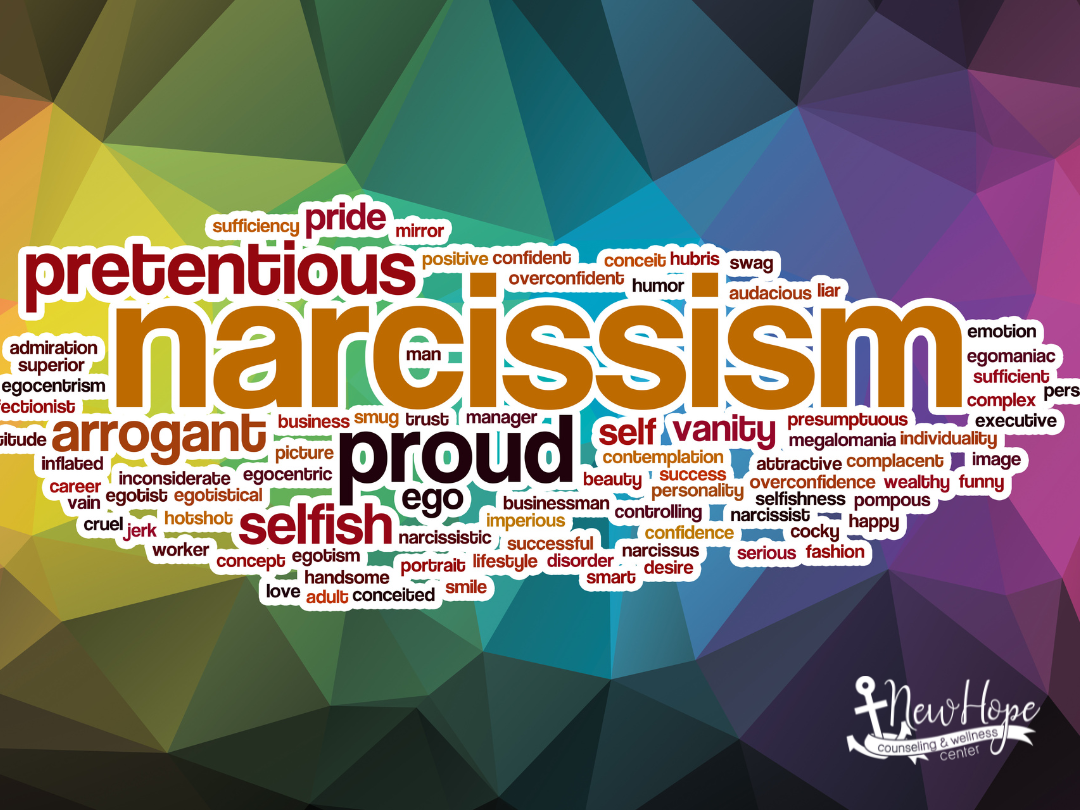I mean it all makes sense when you think about it. After all, a narcissist thinks of themselves first. But is putting yourself first really a bad thing?
Healthy Narcissism vs. Narcissistic Personality Disorder
On some level, we all need to have a healthy dose of narcissism. We all understand the importance of putting your oxygen mask on first before helping others. It is crucial to be kind to yourself and practice self-love and self-care, as well as nurture your self-esteem. All of these are healthy and necessary ways to put your needs first so that you can be there for others.
But in its most severe form called Narcissistic Personality Disorder, a person has a sense of self-importance and entitlement, that is so grandiose that it permeates every aspect of their daily life. Their ego becomes so overinflated that it eclipses all other needs so that they are obsessed with success, have an overwhelming need to be admired, and/or need to be the center of all attention.
This means all of the oxygen in a room is consumed by a narcissist.
People with Narcissistic Personality Disorder are often difficult to quickly size up because at first, they can be incredibly charming and disarmingly generous. But that quickly changes.
Very soon, people with Narcissistic Personality Disorder will reveal their true demeanor and characteristics which can include the following:
- Extreme jealousy
- Uncontained arrogance
- Complete lack of empathy
- An exaggerated sense of entitlement
- Unwillingness to accept responsibility
- Casts blame onto others – especially their partner
- Almost never apologizes (because they never believe to be at fault)
- Will punish their partner because they feel they deserve it or even just for pleasure
- We can agree that people with Narcissistic Personality Disorder make terrible partners but the question is, are extreme narcissists abusive or even violent to their partners?
The Narcissist and Domestic Violence – What Is the Connection?
If we start with the definition that a narcissist is not considerate of the needs of other people we can naturally assume they have the potential to be abusive to their partners.
But here is the tricky part.
According to the Domestic Violence Hotline, “Mental health disorders are commonly used as a way to justify and excuse abusive behaviors when in reality an abusive partner is in control of their actions.”
Narcissistic Personality Disorder is a medical condition whereas being an abusive partner is a choice. This is an important distinction because it should be recognized that just because someone has a mental health disorder, does not mean that a person will be emotionally or physically abusive. Conversely, even if someone has Narcissistic Personality Disorder and is a domestic violence abuser, on some level they are making the conscious choice to be an abuser. Their medical condition should never be used as an excuse for being abusive.
So intuitively it was strongly suspected that there was a connection between extreme narcissism and domestic violence. But in June of 2021, a groundbreaking study actually confirmed a consistent link between narcissistic traits, aggression, and violence. In fact, narcissism was linked to all different types of aggression including physical, verbal, and bullying, as well as to violence. The study concluded that narcissism is in fact an important risk factor for both aggression and violence.
The researcher states this best, “They’re entitled, they feel superior, they think they’re worth more than others,” Kjærvik explains. “But at the same time, if you have shame there, or threaten this insulated ego that they have, they tend to get more aggressive because they’re trying to protect that ego. And when people are shaming them, their way of protecting this picture of themselves as this majestic superior person is to lash out in anger.”
This connection was so pronounced that the study found that the more severe the Narcissistic Personality Disorder is, the more severe the aggression is.
But Why Some Are Narcissists Aggressive and/or Violent?
The irony is that even though they are 100% convinced they are superior and more deserving than others, the reality is that people with Narcissistic Personality Disorder actually have incredibly low self-esteem. They require constant and ongoing adulation and external validation which is referred to as narcissistic supply.
Just like an alcoholic who needs and craves alcohol, the narcissist insatiably craves their narcissistic supply. It feeds the narcissist’s sense of self-worth and self-esteem. It is their fuel. They get this fuel from attention, adoration, drama, or even from the conflict and fear they instill into others.
And they get it from various sources – two types of which we will address here.
The Sycophant and the Narcissist
Merriam-Webster defines “sycophant” as an “obsequious flatterer or self-seeker,” with an attitude of “fawning, flattery, or adulation” like a parasite “who clings to a person of wealth, power, or influence…” The sycophant seeks advantage by servility and in the end, is actually a false flatterer.
In short a perfect, unending source of narcissist supply.
You would think the Narcissist and the Sycophant would be a match made in Heaven, but in reality, it is a symbiotic relationship that is conjured from the depths of Hell. It is a discussion for another time, but suffice it to say, this relationship does not have a fairytale ending.
The Victim and the Narcissist
Narcissists also get their fuel from a variety of sources other than sycophants. They can prey upon family, friends, coworkers, and especially partners. Narcissists cannot maintain long-term deep friendships because at some point everybody detaches from them once they have figured them out. And when most have extracted themselves from the toxicity of the narcissist, it falls upon the partner to provide the narcissist supply.
And that’s when it can get very dangerous.
After all, partners of narcissists will never be able to provide enough of this fuel or narcissistic supply to the narcissist – ever. They are insatiable. So, when the narcissist cannot get what they need, many times the partner will bear the largest brunt of their abuse.
Narcissists depend on recognition from others. If their partner fails to provide what they want and need, the results may be very abusive. They will gaslight, suppress, control, and then attack, and belittle their partners. After all, when their partner is beaten down and submissive the narcissist perceives themselves to be superior.
In relationships, narcissists can also become sadistic. As abuse escalates, partners may try to become even more passive and even more submissive as they try to avoid coming under further attack. But that may not be enough as an extreme narcissist may actually use torture and abuse as means to punish their partner for not providing what they need, and may even justify these actions by claiming them to be well-intentioned.
They use their abuse as a way to reassert their superiority. The narcissist can be ruthless and unable to empathize with their victim partners. They can even take pleasure in the pain they cause.
The narcissist abuses in many ways including verbally, mentally, and even physically. Brutal tactics include a broad spectrum of bullying, threats, physical violence, and even (ironically) withholding love and attention; deeming their partner unworthy. All of this makes the narcissist feel superior and omnipotent.
By the time they are done, their partners can feel they deserve the abuse. This phenomenon is referred to as narcissistic abuse syndrome. The victim is abused and demeaned so badly that they believe they deserve the abuse. In fact, the gaslighting and abuse become so severe that the partner can no longer distinguish their thoughts from the narcissistic abuser’s.
How to Recognize If Your Partner Has Narcissistic Personality Disorder
When it comes to escaping a relationship with someone who has Narcissistic Personality Disorder, recognizing the signs as early as possible will help you escape with the least amount of physical and emotional damage. That means it is crucial to recognize and identify the red flags as early as possible.
Here are a few of the early warning signs to help you recognize if your partner is a narcissist:
- Does your partner try to control your behavior?
- Does your partner try to gaslight you?
- Is your partner self-centered and needy of your attention?
- Does your partner invade your privacy and violate your boundaries?
- Does your partner always think they are right and rarely apologize to you?
- Do you feel isolated by your partner and discouraged from socializing with others?
- Does your partner try to get you to dislike your friends and family or highlight negative attributes (real or imagined) in others?
- Does your partner verbally abuse or belittle you?
- Are you fearful of displeasing your partner?
- Have they had many failed relationships with a history of abuse?
- Do you make excuses for your partner to people when they comment about their poor behavior?
- Does your partner appear happy or pleased when you are miserable?
- Does your partner punish you by ignoring you or giving you the silent treatment?
- Is your partner cruel to you? Do they seem to enjoy being cruel?
- If at any time your partner physically abuses you, makes you feel fearful, or terrifies you, call 911 immediately for help.
Remember, domestic violence (whether your partner has a mental disorder such as Narcissistic Personality Disorder or not) is a crime that can result in serious injury and even death.
What To Do If Your Partner Has Narcissistic Personality Disorder
When you first meet a narcissist, you can very easily be duped by their charm. Falling in love with a narcissist is easy, but staying in love is painful. Recognizing and admitting that your partner is a narcissist is a significant turning point for you and from there you can progress into gathering the strength you need to leave.
But there may be a step in between you realizing your partner is a narcissist and before you have the strength to leave. That is, you may not be able to shake this feeling that you can try and get your partner some mental health treatment.
Don’t.
It is highly unlikely that someone with Narcissistic Personality Disorder ever receives treatment for their condition. Although it is possible for a narcissist to get mental health treatment, it is extremely rare. We do not have a treatment protocol or any approved medications to treat narcissists. Further, on the rare occasion a narcissist does seek treatment, they have difficulty forming a therapeutic relationship and tend to terminate treatment prematurely. After all, narcissists have trouble maintaining relationships and do not see anything wrong with their behavior.
But it is a very good idea for the victim to get help. People who have survived being in a relationship with a narcissist usually come out of it feeling as if they were put through the wringer. They are mentally, emotionally, and physically drained. Some people feel shame and even suffer physical symptoms related to PTSD.
Ending a relationship with a narcissist is incredibly difficult. If you are stuck in your relationship with a narcissist, a professional counselor or mental health professional can help you prepare and plan for a safe breakup.
Recovering from a narcissistic relationship takes time. With time and help from a professional, healing is possible. If you believe you or someone you know is in an abusive relationship with a narcissist, we can help. We can work one-on-one with you to rebuild your self-worth, restore a self-care routine, and help you set personal boundaries to protect yourself. Contact us today … we will advocate for you. You are not alone.
If you or a loved one are a victim of domestic violence, contact the National Domestic Violence Hotline at 1-800-799-7233 for confidential assistance from trained advocates.
If you have suffered from Narcissistic Abuse, our new course Hope After Narcissistic Abuse may be helpful. Check it out here.








